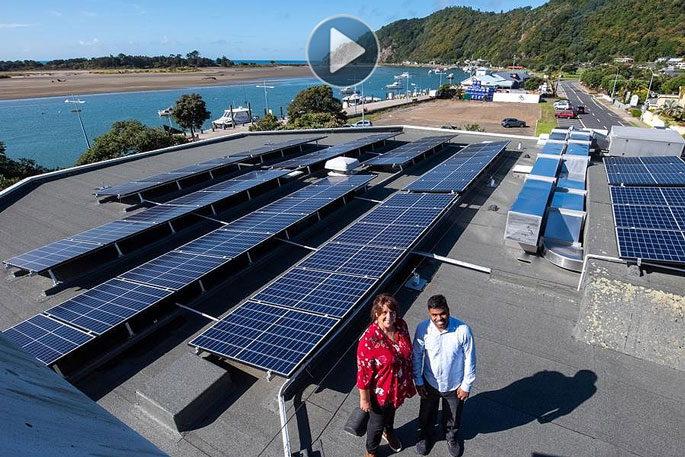Greenhouse gas emission reductions achieved by the Bay of Plenty Regional Council in its first year of a new programme are proving to be promising.
The council recently completed its second annual audit as part of the Toitū carbon reduce certification.
The emission reductions that Regional Council has achieved in its first year of the programme are very promising and may provide an illustrative pathway for other organisations on the same journey, says a statement released by the council.
Toi Moana's Customer Contact Manager, Rachael Burgess, explains why it was important Council leads the way in its corporate approach to reducing greenhouse gas emissions.
"As a Regional Council, a lot of our day-to-day work is really focused on sustainability and environmental protection – it's built into our DNA so to speak.
"So we need to make sure that our corporate structure – our buildings, our fleet and our people, are on track to a lighter carbon footprint as well.
"We have taken a different approach in a number of key areas, particularly through our building upgrade programme and by driving behaviour change internally."
Toi Moana has also joined the Toitū Carbon Reduce programme to get clear baseline data on emissions, set emission reduction targets and take conscious steps to reduce emissions each year.
Progress is tracked, measured, reported and verified by Toitū in accordance with ISO14064-1 or PAS 2050 to maintain certification.
For Toi Moana, total CO2 emissions this year were a little over 1,000 tonnes of carbon dioxide, eight per cent lower than last year's total emissions.
The initial audit indicated that councils' major source of corporate emissions come from fuel, electricity and air travel.
"Most of the reductions we've achieved so far have been due to recent energy efficient building retrofits across the three primary office sites in the Bay of Plenty," says Rachael.
"Over the last couple of years, the organisation has been undertaking significant improvements at our Tauranga and Whakatāne offices. This provided an opportunity to include a number of energy reduction features like solar panels, wind turbines and LED lighting throughout. The Council will soon add rain water harvesting to the Regional House building in Tauranga to collect and store rainwater for future use.
"It was also an opportunity to make sure we allowed for additional charging points for electric vehicles as we work to replace our light motor vehicles to meet the central government target of fully-electric by 2025."
Regional Council's Sustainability Officer, Selva Ganapathy says there are currently 10 electric vehicles in the fleet and charging stations at each of its three office locations. Council plans to have all light motor vehicles move to electric in the next four years.
"Covid-19 also created a considerable, but short term, drop in emissions and the challenge has been to try and make the changes experienced during that period a long-term and sustainable solution.
"With our flexible work policies, more people are working from home for at least parts of their week. Our latest figures indicated that on any given day one in six staff is working from home, which is 75 fewer cars on the road that day. Although these emissions don't get reported as part of our operational emissions, it is really encouraging to see Regional Council staff being low-carbon champions.
"Better uptake of technology like Zoom and Microsoft Teams has made it possible to meet remotely more seamlessly, so virtual meetings are much more common. This significantly reduces trips taken by staff between offices. All of these changes across our offices and 400 staff really add up to greenhouse gas emission reductions."
However, Selva is quick to point out that it's more physical changes that need to happen in an organisation.
"It is even more important to change behaviour of staff in the office than just make changes to solar panels or wind turbines.
"Some changes are quite easy and clear – we removed individual bins and moved to a community bin approach. It means people think before they throw things in the bin. We are also diverting a lot of the green waste to our own worm farm on site.
"That is roughly 50kg of waste being fed to the worms each day. That is a saving of 19,000kg of GHG emissions in a year - the same as taking more than two vehicles off the road each year. These smaller changes then add up to a bigger change eventually.
"And the best thing about behaviour change is that it flows out from the office and into the homes and communities of our staff.
"Neighbours might start carpooling or biking to work together. People might start their own worm farms or compost at home. So behaviour changes have the potential to impact much more widely than just one organisation."



1 comment
Virtue signalling for no gain
Posted on 31-03-2021 20:48 | By Let's get real
How many years before these efficiencies pay for themselves and start showing a saving for ratepayers....? We are held accountable for emitting 0.18% of global emissions. How much international plaudits and recognition are we to secure from installing hyper-expensive new technology...? Because we're not going to make one iota of difference to the worlds issues other than employing more staff to maintain and wash the panels on the roof and with our health and safety requirements, goodness knows how much that's going to cost. Our politicians are looking towards their next job at the expense of the nations taxpayers and ratepayers.
Leave a Comment
You must be logged in to make a comment.